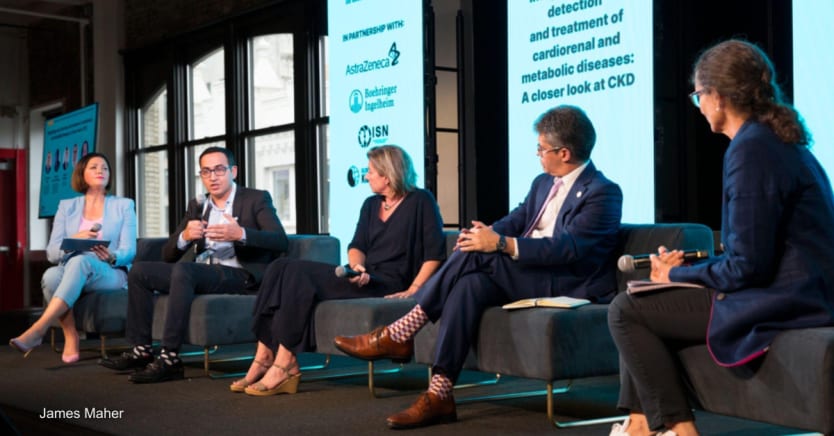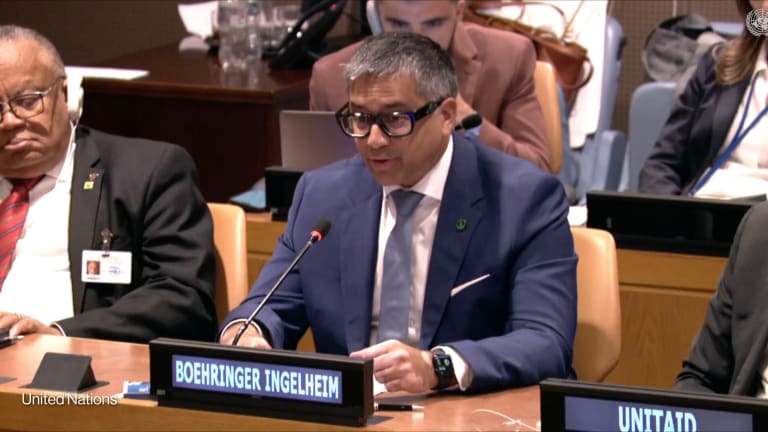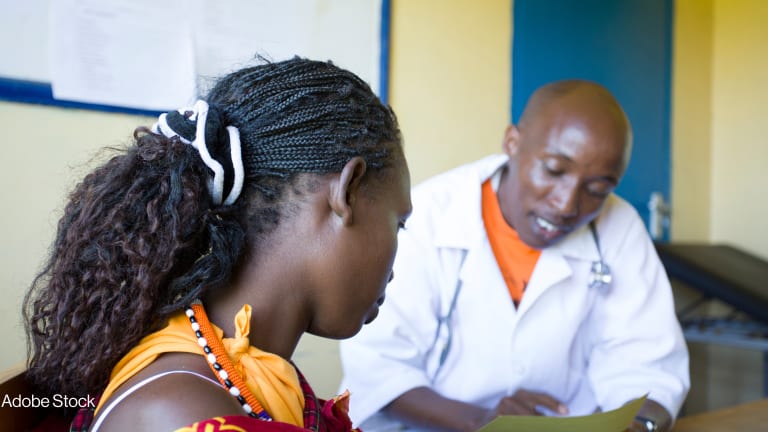
Cardiovascular, renal, and metabolic diseases are interconnected conditions that specifically impact the heart, kidneys, and the body's metabolism. These noncommunicable diseases, or NCDs, affect hundreds of millions of people worldwide, with an estimated 1 in 3 people with a cardiovascular, renal, or metabolic disease living with two or more of these chronic conditions. The impact these diseases have on people, society, and our planet is immense and growing, yet they remain underdiagnosed and undertreated, and their interconnections are underrecognized.
A key example is chronic kidney disease, or CKD, which too often remains hidden on the global health agenda. CKD — a leading cause of morbidity and mortality globally — currently affects nearly 850 million people, and by 2040, is expected to become the world’s fifth leading cause of mortality. Despite this growing impact, global NCD public health initiatives such as the United Nations’ Sustainable Development Goals and the European Union’s 2022-2027 NCD initiative Healthier Together do not currently recognize kidney disease as a health priority.
On the sidelines of the 79th session of the United Nations General Assembly, Devex hosted the event Transformative health policies for NCDs: Emphasizing the importance of an integrated approach for cardiovascular, renal and metabolic conditions, organized and funded by AstraZeneca and Boehringer Ingelheim, in partnership with the International Society of Nephrology, and the Global Patient Alliance for Kidney Health, to explore how integrated approaches to these highly interconnected diseases, like CKD, could result in earlier detection, more effective treatment, and reduced costs for overstretched health systems.
At this event, a diverse group of health care professionals, policymakers, patient advocates, and multilateral organization representatives tabled the changes they will push for at the Fourth United Nations High-Level Meeting on NCDs and Mental Health in 2025 and in the next version of the World Health Organization’s NCD global monitoring framework and NCD action plan.
Here are six takeaways from the event:
1. It is time to elevate CKD as a global urgent public health priority
As stressed by Hannah Vaughan Jones, senior counsel at Incisive Health and moderator of the discussion, “We need to take action now to elevate CKD as an urgent global health priority and put the policies in place to diagnose patients at earlier stages, ensuring that they do get the right treatment for their conditions.”
Dr. Valerie Luyckx, chair of the advocacy working group at the International Society of Nephrology, said she was hopeful that CKD would be recognized in the agenda after WHO acknowledged kidney disease to be the ninth leading cause of death globally. Many countries are struggling as the costs associated with CKD are too high for their budgets to absorb, she noted, “so we need to get this on the table.”
Next year’s World Health Assembly represents a critical opportunity for WHO to prioritize CKD in its NCD framework. Guatemala, for example, will push for a CKD resolution, said Joaquin Barnoya, the country’s minister of health, noting that resolutions are definitely no magic bullet but set the stage, providing governments with some guidelines and helping them to know where to go next. Other global policies can also support governments when making choices, such as a new WHO ‘best buy’ on kidney screening, recognizing the evidence available on the cost-effectiveness of such interventions.
2. An integrated approach to chronic disease management is critical, cost-effective, and will improve patient outcomes
The Global Fund embraces integration of chronic diseases
Links between AIDS and TB and noncommunicable diseases have driven calls for the Global Fund to expand its focus to offer more funding for services that integrate NCDs such as cardiovascular disease and diabetes.
An integrated approach to cardiovascular, renal, and metabolic diseases — from diagnosis and care delivery to how policymakers invest — is vital for saving lives and money, argued Hannah Vaughan Jones.
In support, Chris Bryant, a patient ambassador for the American Kidney Fund, relayed how siloed care for diabetes contributed to delays in his diagnosis of CKD until it was already late stage, requiring dialysis.
There is a strong connected relationship between kidney disease and other NCDs. While obesity and diabetes contribute to CKD and CKD contributes to heart disease, heart disease also exacerbates metabolic risk and kidney disease, noted Melanie Turner, director of international science at the American Heart Association, highlighting the interconnected nature of these conditions.
A WHO spokesperson urged that it is not enough to tackle each disease separately, given kidney patients often present with comorbidities.
This could be relatively easy and cheap, proposed Navdeep Tangri, professor at Max Rady College of Medicine at the University of Manitoba. “If you’re a country which is screening for hypertension using community workers, dip the urine for protein.”
“Although countries are under difficult fiscal constraints,” noted Monique Vledder, head of the World Bank’s Global Health Unit, “there is a lot that we can do collectively to tackle the burden of chronic diseases, but that is going to require more financing and a much more prioritized and targeted focus on investment in those interventions that are most impactful.”

3. Early targeted screening and treatment could transform health outcomes and slash care costs
Panelists agreed that policies aimed at early and targeted screening are key to diagnosing cardiovascular, renal, and metabolic conditions at an early stage. For example, diagnosing CKD early could delay or prevent kidney failure or dialysis at a time when health care systems and economies are under strain.
In France, the most expensive disease therapy per patient is dialysis, whose costs outstrip treatments for lung cancer and cystic fibrosis, noted Amanda Harvey-Dehaye, project lead for patient advocacy for early kidney disease prevention through the Renaloo association in France. To combat these rising costs, she highlighted that since 2021, the French government has recommended screening anybody over the age of 65 and extended this in 2023 to include all people with risk factors, such as diabetes or hypertension.
Given that 10% of the population has some stage of kidney disease, “it’s very important to be screened … so we can avoid getting on the expensive treatment of dialysis,” agreed Bryant.
Shifting some responsibility for NCD care — including screening — into primary care and community outreach would also relieve pressure on more specialist health facilities and represent a more effective use of health care services and resources, argued Vledder.
To avoid kidney care becoming an additional siloed burden for governments to wrestle with, “one of the critical things that we’re hoping for through the WHO is to integrate kidney care into existing programs,” said Valerie Luyckx.
4. Securing financing commitments for NCDs requires a multistakeholder approach
Investing in NCD prevention, diagnosis, and treatment could generate huge savings for countries of all income levels, said Katie Dain, CEO of the NCD Alliance. However, finance has been one of the biggest Achilles' heels in the global response, so securing strong financing commitments — and ideally targets — is a key aim for the high-level meeting, she added.
“In preparation for next year’s high-level meeting, in June 2024 the World Bank and WHO co-hosted an NCD financing forum”, noted Vledder. This was, she said, “a fantastic opportunity to raise more awareness and have those conversations, particularly also between countries in terms of how to translate some of these commitments into realities in implementation.”
The World Bank is also prepared to deploy all its financing tools to reduce the barriers preventing people with NCDs from accessing health services, Vledder added. These range from offering grants and concessional loans to the world’s lowest-income countries to investing in the production of diagnostics via its private sector arm, the International Finance Corporation, or IFC. It really requires a multistakeholder approach, she said.
5. Centralized data can persuade governments to invest in NCDs, but interventions should not be delayed
From our archives:
NCDs are top global killer but trust fund coffers are empty
Noncommunicable diseases kill 41 million each year, with 17 million dying before the age of 70. But a trust fund established last year to provide catalytic support to countries aiming to curb these deaths has yet to receive any funding.
Improving the quality and quantity of data around CKD and other NCDs — and preferably centralizing it — is key to persuading governments to craft effective policies and invest in interventions that work, panelists agreed.
Renaloo, for example, has created satellites to generate patient experience data, conducts a rigorous analysis of kidney registries, and pools expertise from patients, nephrologists, and health economists to build “robust data-driven, evidence-based cases for change that we take to health authorities,” said Harvey-Dehaye.
However, many low- and middle-income countries lack a sophisticated laboratory surveillance system that allows them to gather lab data from across the country and analyze it to identify national trends, noted professor Tangri. For example, Guatemala — whose understaffed and under-resourced health system spends $1 million per month on CKD care — lacks a national chronic kidney disease register, noted Barnoya. This means that despite the country’s mortality rates from the disease surging by 65% over the past decade, its total CKD burden is likely underestimated.
In response to the lack of actionable data, the event also saw the launch of the Inside CKD platform, a CKD modeling platform, initiated and funded by AstraZeneca, designed to project the prevalence and burden of CKD in 31 regions.
6. The U.N. high-level meeting and World Health Assembly could deliver concrete commitments, but preparation must start now
Putting NCDs, specifically interconnected cardiovascular, renal, and metabolic conditions, on the agenda at next year’s U.N. High-Level Meeting on NCDs and Mental Health offers a real opportunity for advocacy, argued Dain. Between now and September 2025, governments will be outlining their implementation of national plans and policies, discussing the challenges they face, and sharing success stories. And while gaining strong political commitments in the final document will be difficult in the current geopolitical climate, advocates must start preparations now and push for wording that is as specific as possible, she stressed. “I’d really encourage the CKD community, along with obviously the broader NCD community, to be thinking very concretely about what you want to see come out of it.”
“The high-level meeting should also link to other global health and development agendas — such as universal health coverage, pandemic preparedness, and humanitarian settings — in its work on NCDs,” added Dain.
Maintain the momentum!
“With the U.N. high-level meeting and World Health Assembly now on the horizon, we have one year to make CKD and interconnected NCDs a global health priority,” Vaughan Jones said. Through collective efforts, we can make a real difference in the lives of those affected by heart, kidney, and metabolic diseases, “so let’s keep the momentum going,” she concluded, and the room agreed.
Watch the recording of the event here.








